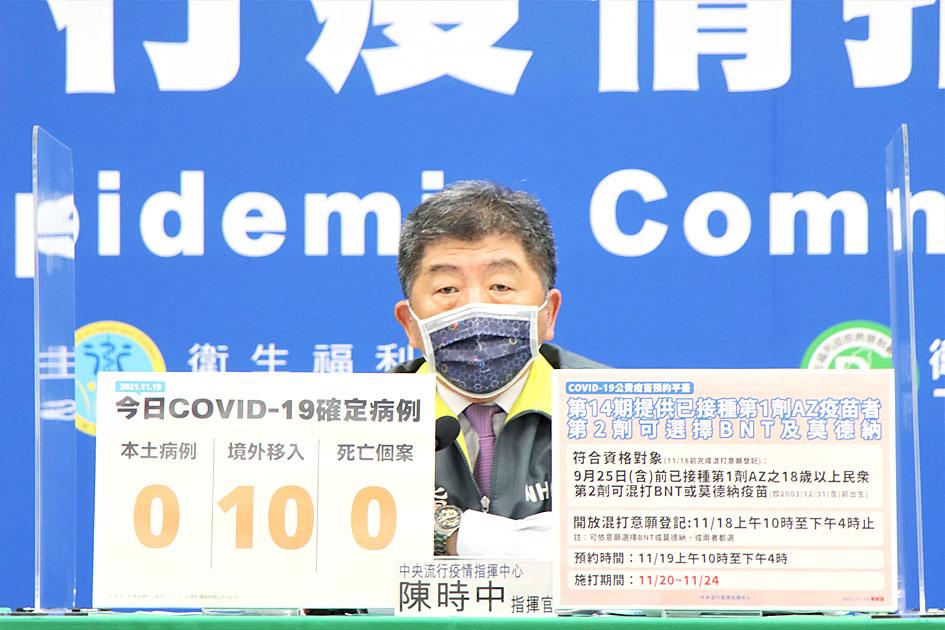A National Taiwan University Hospital (NTUH) study has found that mixing the AstraZeneca and Moderna COVID-19 vaccines offered better protection against the Delta variant of SARS-CoV-2 than two doses of the AstraZeneca vaccine.
The combination led to a better immunoglobulin G (IgG) response and a higher level of neutralizing antibodies against the Delta variant, NTUH Department of Medical Education director Sheng Wang-huei (盛望徽) said yesterday.
The study, conducted from June to August, tested the antibody levels of 400 vaccine recipients 14 and 28 days after their second dose, Sheng said.

Photo: Yang Yuan-ting, Taipei Times
Participants were divided into four groups — those who got two AstraZeneca jabs eight weeks apart; those who first got the AstraZeneca jab and then the Moderna jab eight weeks later; those who first got the Moderna jab and then the AstraZeneca jab four weeks later; and those who got two Moderna doses four weeks apart, Sheng said.
They were aged 20 to 65, and 75 percent were female, the hospital said.
Those who got two AstraZeneca doses had IgG levels of below 500 binding antibody units per milliliter (BAU/ml) after 14 days, it said.
That compares with recipients of the AstraZeneca/Moderna combination, who had IgG levels exceeding 2,500 BAU/ml, and those who got two Moderna doses, who had IgG levels exceeding 4,000 BAU/ml.
AstraZeneca recipients had levels of virus neutralizing antibodies of less than 50 international units per milliliter (IU/ml) in both blood tests, it said.
Those who received the AstraZeneca/Moderna combination had levels of 300IU/ml after 14 days, it said.
Centers for Disease Control Deputy Director-General Philip Lo (羅一鈞), deputy chief of the Central Epidemic Command Center’s (CECC) medical response division, said that people who received two doses of the AstraZeneca vaccine should not to be concerned about their protection from the virus.
The study was based on an interval of only eight weeks between the AstraZeneca doses, while overseas studies have shown that antibody levels are higher when the interval between the doses is larger, he said.
Separately yesterday, the CECC said mix-and-match vaccinations that begin today would run until Wednesday next week, instead of until tomorrow, as originally planned.
By 4pm yesterday, 180,000 people had made appointments to get their second dose in the mix-and-match program, it said.
Taiwan yesterday reported 10 new cases of COVID-19, all contracted overseas, and no deaths from the disease, the CECC said.
The cases were three Taiwanese and seven foreigners — from Indonesia, Mongolia, Vietnam and the Philippines, it said.

China might accelerate its strategic actions toward Taiwan, the South China Sea and across the first island chain, after the US officially entered a military conflict with Iran, as Beijing would perceive Washington as incapable of fighting a two-front war, a military expert said yesterday. The US’ ongoing conflict with Iran is not merely an act of retaliation or a “delaying tactic,” but a strategic military campaign aimed at dismantling Tehran’s nuclear capabilities and reshaping the regional order in the Middle East, said National Defense University distinguished adjunct lecturer Holmes Liao (廖宏祥), former McDonnell Douglas Aerospace representative in Taiwan. If

TO BE APPEALED: The environment ministry said coal reduction goals had to be reached within two months, which was against the principle of legitimate expectation The Taipei High Administrative Court on Thursday ruled in favor of the Taichung Environmental Protection Bureau in its administrative litigation against the Ministry of Environment for the rescission of a NT$18 million fine (US$609,570) imposed by the bureau on the Taichung Power Plant in 2019 for alleged excess coal power generation. The bureau in November 2019 revised what it said was a “slip of the pen” in the text of the operating permit granted to the plant — which is run by Taiwan Power Co (Taipower) — in October 2017. The permit originally read: “reduce coal use by 40 percent from Jan.

‘SPEY’ REACTION: Beijing said its Eastern Theater Command ‘organized troops to monitor and guard the entire process’ of a Taiwan Strait transit China sent 74 warplanes toward Taiwan between late Thursday and early yesterday, 61 of which crossed the median line in the Taiwan Strait. It was not clear why so many planes were scrambled, said the Ministry of National Defense, which tabulated the flights. The aircraft were sent in two separate tranches, the ministry said. The Ministry of Foreign Affairs on Thursday “confirmed and welcomed” a transit by the British Royal Navy’s HMS Spey, a River-class offshore patrol vessel, through the Taiwan Strait a day earlier. The ship’s transit “once again [reaffirmed the Strait’s] status as international waters,” the foreign ministry said. “Such transits by

Taiwan is doing everything it can to prevent a military conflict with China, including building up asymmetric defense capabilities and fortifying public resilience, Vice President Hsiao Bi-khim (蕭美琴) said in a recent interview. “Everything we are doing is to prevent a conflict from happening, whether it is 2027 or before that or beyond that,” Hsiao told American podcaster Shawn Ryan of the Shawn Ryan Show. She was referring to a timeline cited by several US military and intelligence officials, who said Chinese President Xi Jinping (習近平) had instructed the Chinese People’s Liberation Army to be ready to take military action against Taiwan